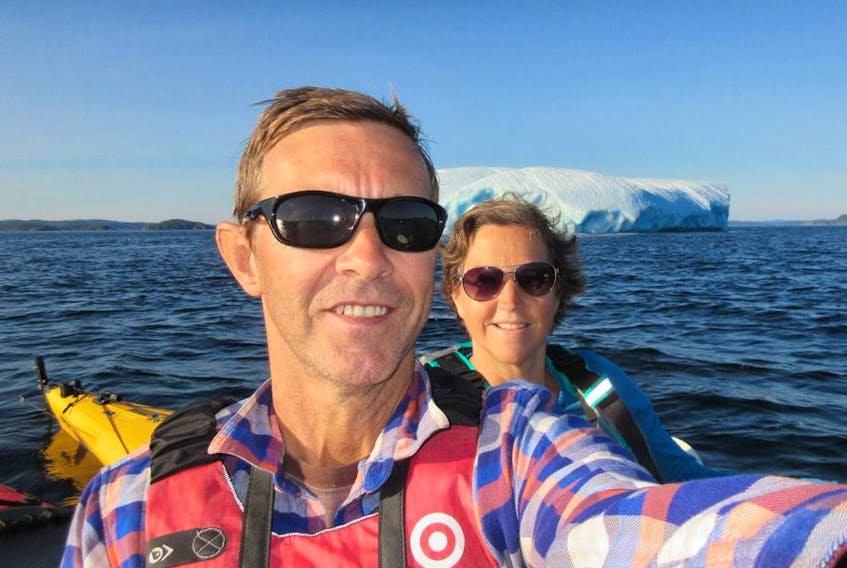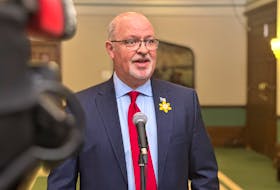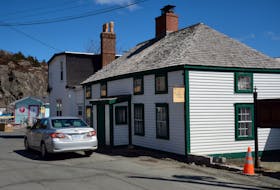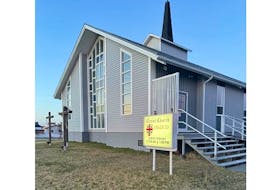On a dull, windy day in September 2014, Mike Parsons climbed in a speedboat and steered his way to his favourite spot on Little Bay Islands.
Growing up in the tiny community on the northeast coast of Newfoundland, he had gone to that same isolated place, called Ben Batts Cove, many times over the years to clear his head or just relax.
This time, he went there to end his life.
“I got to the point where the stuff inside of me was just chewing me up. I couldn’t take it anymore,” Parsons said.
“It all just came to a head and I didn’t want to live anymore.”
He had just come off a four-day bender of continuous drinking. He hadn’t slept, was shaking and sweating and had told his wife to leave.
Parsons had hit rock bottom.
Fortunately, soon after arriving at that cove, he sobered up enough to realize he didn’t want to die, and recognized that if he kept drinking, he would.
“I knew that 100 per cent. I know that 100 per cent now,” the 50-year-old told The Telegram Tuesday.
“I was willing to push everybody away and give up everything, including my marriage, to drink.
“But I guess at that moment, the reality of it all came down around me. I thought about all the people I would be hurting (if I killed myself).”
Parsons somehow made it back and summoned enough strength to go to his father to tell him he needed help.
It was the hardest thing he ever had to do, but turned out to be the best decision he’s ever made.
Parsons has been sober for three years now, but the road to recovery wasn’t easy.
“I’m not going to lie. It was a struggle,” he said.
It started with social drinking for Parsons, who, like many, would associate alcohol with having a good time.
“I’d been a heavy drinker, but never classified myself as an alcoholic,” he said. “As a Newfoundlander, the difference between being a social drinker and heavy drinker is a pretty grey line.”
From the outside, Parsons seemed to have everything going for him — a successful job working first with DFO in Ottawa, where he moved 20 years ago, and then as a software engineer for an international tech company. He had a loving wife and two intelligent and healthy kids.
“I was a functional alcoholic,” said Parsons, who spent summers in his hometown for 15 years while he lived in Ontario.
“I didn’t think I had a problem. I could handle my booze. I wasn’t some sloppy, fall-down sloppy drunk. If you didn’t really know me, you’d never say I was drunk. I was very skilled at hiding it. Nobody knew what was really going on.”
He and his wife divorced in 2001, but he continued to raise his children and make a good life for them in Round Lake Centre in the Ottawa Valley.
But when his kids moved out eight years ago, his drinking problem got worse.
In 2012, he married Georgina, who liked to drink socially. Together they attended many events and parties where there was plenty of alcohol, and the two often drank together at home.
“But I mostly drank on the sly. I drank lots when she didn’t know,” Parsons said.
His wife, however, suspected something, and confronted him about his heavy drinking.
He quickly dismissed it and continued to drink — even more than before.
Finally, after his episode at Ben Batts Cove, his father took him to the Central Newfoundland Regional Health Care Centre in Grand Falls-Windsor, where he spent a week on the psychiatric ward before being released.
“I was in bad shape,” he said. “My family was so scared because they had never seen me like this before.”
While in hospital, Parsons discovered that a traumatic experience earlier in his life was affecting him more than he realized.
“I’m not prepared to talk about it right now, but it was something I kept to myself for years and years. I was the only one who knew about it,” said Parsons, who opened up about his experience during counselling. “It just ate away at me and I used drinking to mask that.”
He and his wife decided that Parsons should apply to Homewood Health Centre in Guelph, Ont., one of the country’s top rehabilitation facilities. The $10,000 admission fee didn’t matter to them if it meant he would get the treatment he needed. A week after they applied, Parsons was accepted.
He spent two months there, getting treated for addictions and post-traumatic stress syndrome.
“The program is excellent because they deal with every facet of addiction. You learn about the science of it …,” he said.
“It was a real eye-opener. I learned this is a progressive disease that affects your brain. Once you’re an alcoholic, you’re always an alcoholic. There’s no cure. But you learn how to cope and you have to make a decision that alcohol can never be a part of your life again.”
Parsons was lucky he could afford the program and had a good support system when he was released — unlike many others, he pointed out.
He’s since retired. Last year, he and his wife moved back to Little Bay Islands to make it their permanent home.
He continues to fight the urge to drink — he’s had a few relapses — but he’s quick to get back on track. He hasn’t had a drink in two years.
“You think, I can have a drink again, but the rock bottom you hit, it keeps getting deeper,” he said.
“I realized I’ll never be able to take a drink — ever — in my life. I’ve fully come to terms to that.”
Parsons chooses to fill his life with positive things — enjoying the outdoors, creating artwork (he’s sold many of his canvases from his Facebook site https://www.facebook.com/littlebayislandsart/), photography and writing.
In a recent blog on Facebook, which he called “Dear Alcohol” — https://www.facebook.com/notes/mike-parsons/dear-alcohol-/10156918123707786/ — Parsons expressed his tumultuous relationship with alcohol and his vow to never go back to it.
The post begins, “Dear Alcohol, we can no longer be friends, ever.”
It goes on to say, “You boosted my confidence and made me feel special. You convinced me that any problem could be overcome just by having a drink. It seemed to work for a long time …
“In the days leading up to our breakup, you convinced me that nothing else mattered only our friendship. … Thankfully, something pulled me back from the brink and I asked for what I had been too afraid to ask for all my life, help …
“Since our breakup, I have learned a lot about you. I see that you were never a true friend and were only using me to get what you wanted – control …
“I have faced my demons and I have grown stronger without you. I have learned that love and life is a far better friend than you ever were. I have learned that each precious moment in the day is worthwhile, and if I need you to be happy, then something else in my life is broken and needs fixing. My body and my mind are healthier since I left you and my true inner spirit has taken your place.
“So this is goodbye, forever.”
Parsons hopes it might help others who are fighting the same battle.
“I see so many people struggling with addiction and alcohol and not being able to get the help they need,” he said. “You live in Newfoundland and you know how hard it is to get any type of mental illness treatment.
“So, I thought maybe my sharing my story, on my private Facebook page, maybe friends would pause for a second and think about themselves, question themselves: maybe I need to reach out.
“If only one person reads it and gives them five seconds to pause, it’s a good thing.”
The post has been shared hundreds of times, with hundreds of comments from people who have been affected in some way by alcoholism.
Parsons’ advice to those struggling with alcohol is to reach out — to a doctor, a relative or community group — to call the province’s mental health line or go online and seek out others who can help.
“You think the only good things in your life revolve around alcohol and you can’t imagine what life would be like without it … but my life now is so much better,” he said.
“I feel like I’m in a good place. I don’t miss one single thing about alcohol …
“I’m not a person who has regrets or wish I had done something better. I look at it as a lesson.
“I'm just thankful I’m still here to talk about it.”
Twitter: TelyRosie









